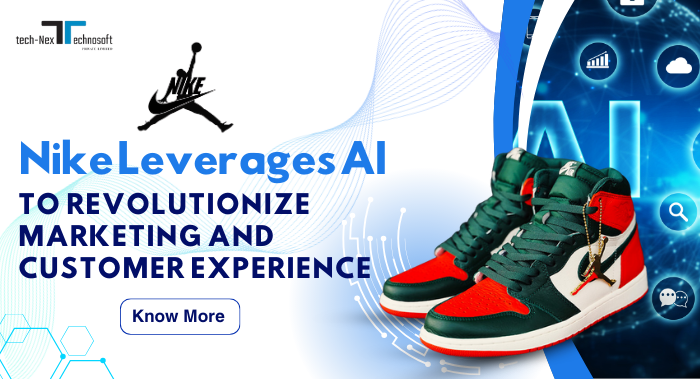Welcome To Technext Technosoft
OUR THOUGHTS

How Nike Leverages AI to Revolutionize Marketing and Customer Experience
25/03/2025
Nike is a leading power in outfits and athletic footwear and has taken up AI (artificial intelligence) to enhance performance, meet worldwide expectations of the customers, and last but not least propel innovation. Nike influences AI in this competitive and vigorous market, to organize its supply chain properly, increase customer experiences, encourage product development, deliver targeted marketing campaigns, and reach sustainability goals. Nike reanalyses business standards and maintains the competitive market by integrating AI.

1. Increasing Customer Experience Using AI
Challenge : As consumers' requirements for online shopping change, customers want interactive and effective digital shopping experiences that can satisfy their needs. E-commerce has also faced a new challenge of increasing returns for wrong product sizing and failing to meet expectations.
Solutions :
- Customized Product Picks : Nike utilizes AI-driven machine learning algorithms for examining vast consumer data like purchasing habits, personal preferences, and browsing patterns, for delivering customized product suggestions.
- Virtual Try-On Technology : To make it easy for customers to get their best fit, Nike launched creative virtual try-on technology powered by computer vision and AR (augmented reality) like Nike Fit, that helps to scan customers’ feet on mobile cameras for perfect fit.
- Natural Language Virtual Assistants : This gives instant support by guiding product searches, helping with tracking orders and answering customer queries.
Result : Using these customer-centric AI strategies Nike has minimized size-related returns, made customer engagement stronger, as well as enhanced conversion rates, increasing customer satisfaction.
2. Optimizing Supply Chain Using AI
Challenge : Another significant challenge Nike faced was controlling its world supply chain, which includes efficient product distribution, demand forecasting, and inventory control.
Solutions :
- Demand Forecasting : AI helps Nike in demand forecasting by seasonal variations, economic shifts, and examining trends of sales.
- Instant Supply Chain Management : AI provides instant monitoring of stock levels across distribution centers and warehouses by decreasing supply chain disruptions as well as enhancing the decision-making process.
- Reducing Waste : By decreasing waste positioning with Nike’s renewable initiatives, AI proposes the best production levels.
Result : With the help of AI, Nike has reduced waste, ensured the quality of its products, and increased efficiency. They are available where and when customers need them.
3. AI-Driven Marketing Campaigns
Challenge : Nike needed to customize messaging to various customer segments and predict the success of the campaign before launch, as conventional marketing methods struggled to associate with its global audience.
Solutions :
- Audience Segmentation : Based on everyone’s preferences, artificial intelligence explores customer behavior for creating targeted marketing strategies.
- Predictive Campaign Management : Data-driven intelligence assists Nike in improving campaign elements, consisting of timing, delivery channels, and most importantly the content.
- Dynamic Content Creation : Enhancing the rate of conversions and engagements, AI creates customized content for various target audiences.
Result : Nike’s marketing approach integrating artificial intelligence has enhanced ROI, increased client engagement, and strengthened its position as a customer-centric brand.
4. Product Innovation With AI
Challenge : Conventional prototyping methods were so expensive and very time-consuming, as a result, Nike had to accelerate product remodelling, guaranteeing sustainability, quality, and functionality.
Solutions :
- Data-Informed Design : For upgrading the product design, AI searches data from wearables, performance metrics, as well as consumer feedback.
- Automated Prototyping : With the help of AI generative design tools, Nike designs and tests the new concept much faster.
- Sustainable Material Optimization : Nike recognizes recyclable materials by integrating AI without compromising on its performance.
Result : AI-assisted Nike to launch advanced products, improve sustainability, and excel in industry trends.
5. Sustainability and Ethical Practices With AI
Challenge : Nike focused on reducing its ecological impact by improving energy, minimizing waste, and embracing sustainable practices.
Solutions :
- AI-Powered Waste Reduction : Artificial intelligence inspects production data to improve resource utilization and reduce material waste.
- Sustainable Manufacturing : Nike keeps track of carbon footprints as well as implementing sustainable production methods by integrating AI.
- AI in Recycling and Circular Economy : AI helps Nike to design sustainable products and manage expired product disposal.
Result : AI assists Nike in taking sustainability initiatives that enhance efficiency, decrease waste, and strengthen the industry’s dedication to sustainable responsibility.
Therefore, by integrating AI, Nike has changed various aspects of business, like supply chain management, sustainability, consumer experience, and product innovation. With the help of artificial intelligence, Nike set modern industry standards in sportswear, by enhancing operations, delivering customized experiences, and stepping ahead toward a sustainable future.
